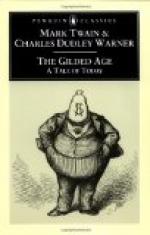CHAPTER LXI.
Clay Hawkins, years gone by, had yielded, after many a struggle, to the migratory and speculative instinct of our age and our people, and had wandered further and further westward upon trading ventures. Settling finally in Melbourne, Australia, he ceased to roam, became a steady-going substantial merchant, and prospered greatly. His life lay beyond the theatre of this tale.
His remittances had supported the Hawkins family, entirely, from the time of his father’s death until latterly when Laura by her efforts in Washington had been able to assist in this work. Clay was away on a long absence in some of the eastward islands when Laura’s troubles began, trying (and almost in vain,) to arrange certain interests which had become disordered through a dishonest agent, and consequently he knew nothing of the murder till he returned and read his letters and papers. His natural impulse was to hurry to the States and save his sister if possible, for he loved her with a deep and abiding affection. His business was so crippled now, and so deranged, that to leave it would be ruin; therefore he sold out at a sacrifice that left him considerably reduced in worldly possessions, and began his voyage to San Francisco. Arrived there, he perceived by the newspapers that the trial was near its close. At Salt Lake later telegrams told him of the acquittal, and his gratitude was boundless—so boundless, indeed, that sleep was driven from his eyes by the pleasurable excitement almost as effectually as preceding weeks of anxiety had done it. He shaped his course straight for Hawkeye, now, and his meeting with his mother and the rest of the household was joyful—albeit he had been away so long that he seemed almost a stranger in his own home.
But the greetings and congratulations were hardly finished when all the journals in the land clamored the news of Laura’s miserable death. Mrs. Hawkins was prostrated by this last blow, and it was well that Clay was at her side to stay her with comforting words and take upon himself the ordering of the household with its burden of labors and cares.
Washington Hawkins had scarcely more than entered upon that decade which carries one to the full blossom of manhood which we term the beginning: of middle age, and yet a brief sojourn at the capital of the nation had made him old. His hair was already turning gray when the late session of Congress began its sittings; it grew grayer still, and rapidly, after the memorable day that saw Laura proclaimed a murderess; it waxed grayer and still grayer during the lagging suspense that succeeded it and after the crash which ruined his last hope—the failure of his bill in the Senate and the destruction of its champion, Dilworthy. A few days later, when he stood uncovered while the last prayer was pronounced over Laura’s grave, his hair was whiter and his face hardly less old than the venerable minister’s whose words were sounding in his ears.




